Compared to other segments in the LED lighting industry, the automotive lighting market is much larger and has higher growth potential. Moreover, its low price sensitivity allows suppliers to realize greater profit growth opportunities. In recent years, driven by the call for energy conservation and carbon reduction, and the four new trends in the automotive industry, the value of automotive lighting has been further explored. Numerous domestic and foreign automotive lighting and automotive LED manufacturers have flocked to this sector. They have collectively contributed to the diversified and high-end automotive lighting market seen today. This phenomenon was vividly demonstrated at the Shanghai Automotive Lighting Exhibition (ALE) held from September 21 to 22, 2023.
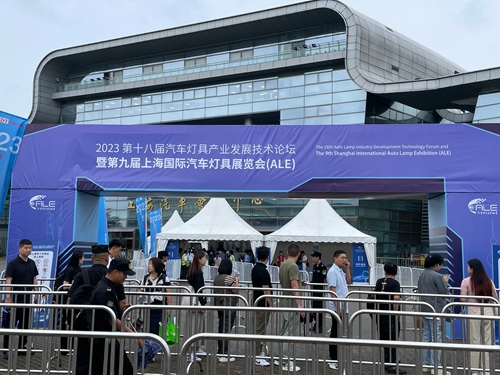
After visiting the event, LEDinside identified four major trends throughout the market :
-
LED auto lamps accounted for the majority of the exhibited products, indicating that LED is capturing more shares in the automotive lighting market.
-
Adaptive driving beams (ADBs), full-width taillights, Mini LED taillights and vehicle-mount interactive lamps have become the new standard that is revolutionizing the automotive lighting sector. In particular, matrix LED headlights and Micro LED headlights—regarded as advanced ADB technologies—have become increasingly mature.
-
In response to the rise of self-driving cars, marker lamps installed as part of automated driving systems (ADS) have gradually become popular.
-
Automotive Mini LED displays garnered a wide range of attention. From lighting to displays, automotive LED makers have expanded their business to various fields.
More details can be found in the following section with information on 14 automotive lighting manufacturers and 12 package/driver IC makers.
Automotive lighting manufacturers: A total of 14 lighting suppliers (i.e., Varroc, Varroc TYC, FORVIA [Faurecia and HELLA], ZKW, Valeo, Changzhou Xingyu [Xingyu], Xunchi Vehicle Industry [Xunchi], Nanning Liaowang Auto Lamp [Liaowang], Anrui, MIND, SEEKIN Auto Lamp [SEEKIN], Laster Tech, QMDJ and HASCO Vision) showcased a wide range of headlights, taillights, assembled lamps, interactive lamps, ambient lights, marker lamps, lens modules and vehicle mount displays.
Package/driver IC manufacturers: A total of 12 global automotive LED suppliers (ams OSRAM, Seoul Semiconductor, Nationstar, Lattice Power, Hongli Zhihui [Honglitronic], APT Electronics, Refond, SUNPU LED, Lightning Optoelectronic [Lightning], Dominant, Everlight and Macroblock) exhibited the latest major technologies and products as well as those representing the upcoming trends, corresponding with automotive lighting manufacturers in the downstream as suppliers.
ADB Headlights: The Rise of Micro LED
At ALE 2023, ADB headlights were still a focal point for the audience, especially the Micro LED-powered headlights, infusing a feeling of novelty. With the adoption of Micro LED, the precision in independent digital control and illumination adjustment flexibility of ADBs have further improved, thereby enhancing driving safety. As public information reveals, car manufacturers such as Porsche and Hyundai Mobis along with tier-1 suppliers have already adopted Micro LED ADB headlights.
Moreover, automotive lighting manufacturers including FORVIA, Varroc TYC, and Xingyu exhibited a Micro LED headlamp installed in the Porsche Cayenne, an ADB headlight and an ADB module, respectively.
FORVIA developed the Porsche Cayenne headlamp jointly with Nichia and Infineon. Nichia (Micro LEDs) and Infineon (integrated LED driver ICs) developed the Micro LED pixel array technology μPLS, integrating 16,384 pixels. The product has been launched this year
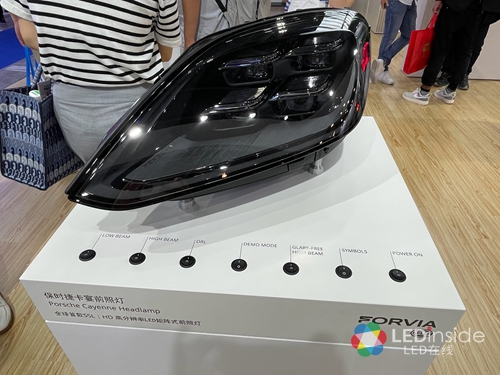
▲ The Porsche Cayenne headlamp
Varroc TYC showcased an ADB headlight comprising 25,600 Micro LED pixels, featuring fully automatic dynamic control and projection of high-resolution images onto the road surface. The headlamp comes with an expanded field of vision, which helps reduce potential risks and optimize driving experiences. Varroc TYC revealed that this product is expected to be mass produced in 2024.
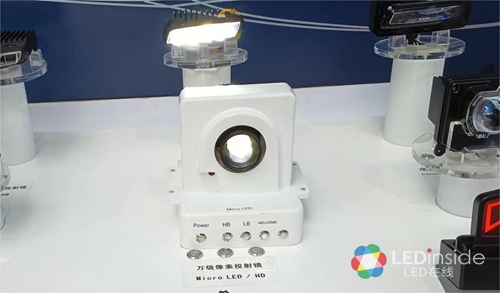
▲ ADB headlight by Varroc TYC
Xingyu exhibited a high-definition ADB module that also integrates 25,600 Micro LED pixels, capable of projecting images and text onto the ground. It can serve as a guide or warning for oncoming vehicles and pedestrians. This module can be installed in headlights and performs real-time correction of the projected image based on the assembly position and projection area, ensuring the effectiveness of the ground projection pattern.
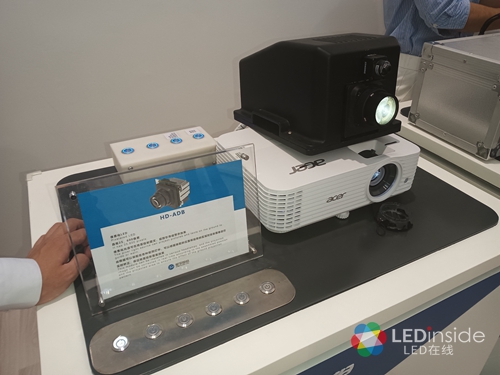
▲ HD-ADB module by Xingyu
Anrui exhibited a digital ADB headlight featuring local dimming and the Aston Martin ADB headlight, with the latter utilizing the WIPAC long-range ADB matrix module and an active cooling system.
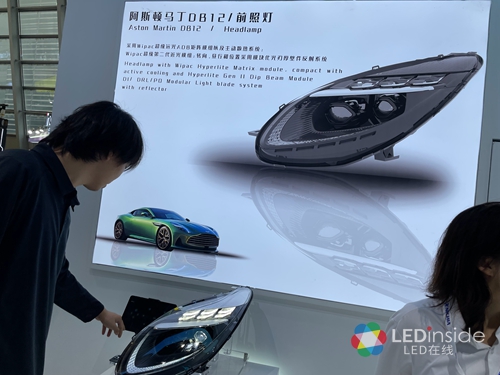
▲ The Aston Martin ADB headlight
Among automotive LED manufacturers, ams OSRAM, Nationstar, and Lattice Power focused on Micro LED-based headlight technologies and products.
ams OSRAM’s high-resolution EVIYOS 2.0 has been mass produced and adopted by European car manufacturers.
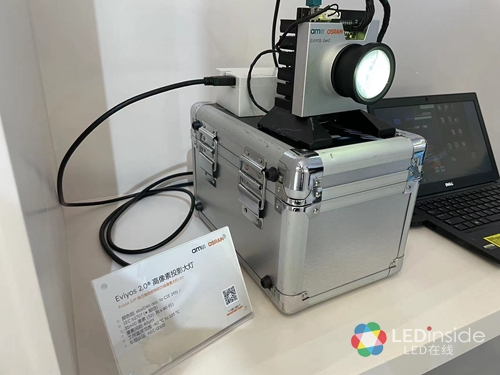
▲ The EVIYOS 2.0 high-resolution projection headlamp
Nationstar showcased a Micro LED light source module (sample) for ten-thousand-pixel-grade digital headlights, with 52,800 pixels and a pixel pitch of 30μm. The brightness of the light source exceeds 30M nits. Nationstar utilizes eutectic bonding technology to integrate the Micro LED blue chip array onto a CMOS control circuit, enabling independent control of individual pixels throughout the array. By combining with high-luminance white light conversion media, the Micro LED light source delivers ten-thousand-grade pixels.
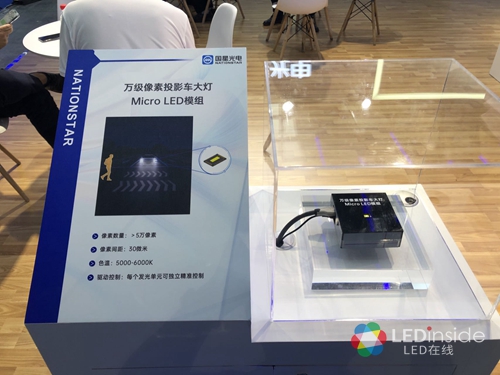
▲ Micro LED module for digital headlights with ten-thousand-grade pixels
Lattice Power introduced two ADB matrix headlight modules, one comprising silicon-based Micro LED chips and the other coming with matrix CSP LED chips. Both modules can achieve local dimming and independent light control for each pixel unit.
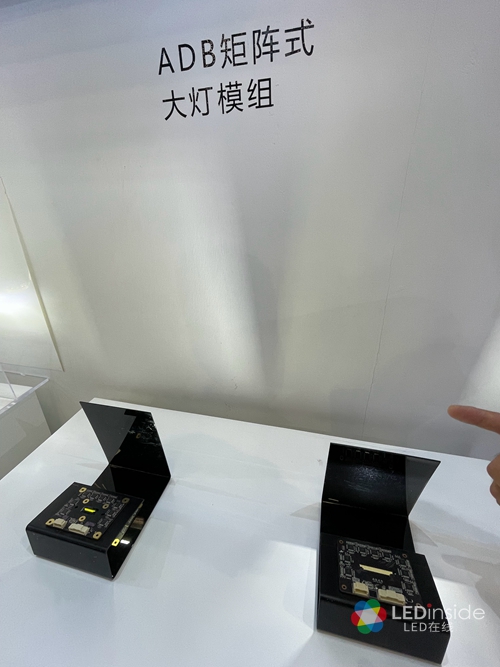
▲ ADB matrix headlight module
APT Electronics also showcased a 100-pixel communication system for autonomous analysis and recognition.
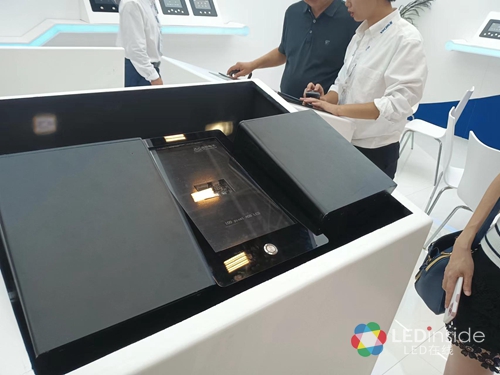
▲ ADB headlight featuring 100 pixels
Seoul Semiconductor introduced the WICOP Pixel LED, which can be aligned with ADB headlight requirements, with options of 18 and 112 pixels.
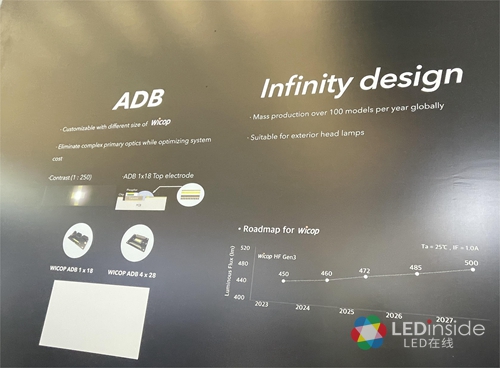
▲ WICOP Pixel LED
To meet the demand for dynamic brightness adjustment of LEDs with ADB headlights, driver IC manufacturer Macroblock exhibited a corresponding driver IC: MBI6353Q. This product can control up to 48 LED pixels, increase brightness by driving multiple LEDs in single cascade and drive the channels in parallel to boost drive current. It also features 4,096 levels of brightness, capable of adapting to different environments.
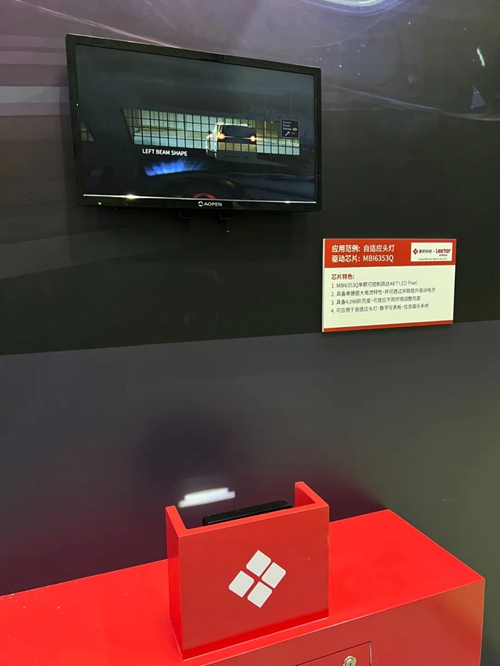
▲ MBI6353Q
Taillights: Adoption of Full-width Design and Mini LED to Highlight Individuality
As taillights are not as strictly regulated as headlights, they are given more room for creativity. They serve as a focal point for carmakers to differentiate themselves and improve brand awareness. In recent years, there has been a trend towards personalization and information communication in taillight design, with full-width taillights and Mini LED taillights becoming popular in the automotive industry.
At the exhibition, FORVIA, Liaowang and Valeo all showcased full-width taillights. Specifically, FORVIA's slim full-width taillights featuring animation have been installed in the Polestar 2 model.
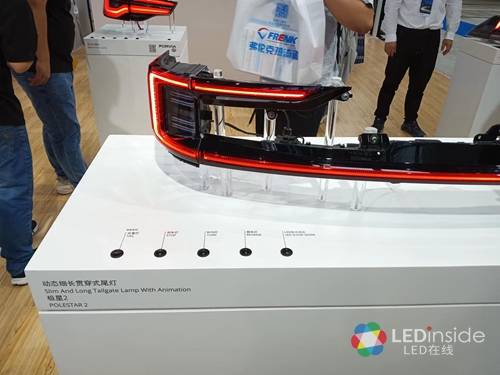
▲ Full-width taillight by FORVIA
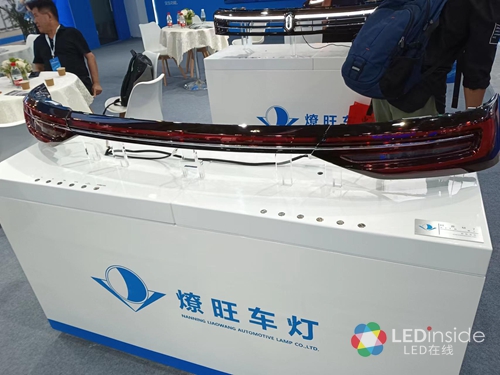
▲ Full-width taillight by Liaowang
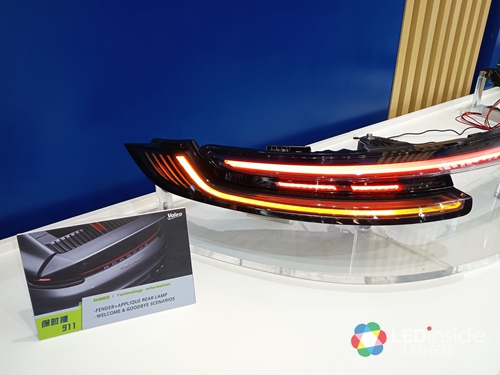
▲ Full-width taillight by Valeo
In addition to full-width taillights, the exhibition also featured headlight applications. Varroc introduced an innovative pillar-to-pillar headlight featuring the P1.5 full-color RGB Mini LED COB solution and 10,000-20,000 pixels. It is currently in mass production and is installed in the Changan Qiyuan CD07.
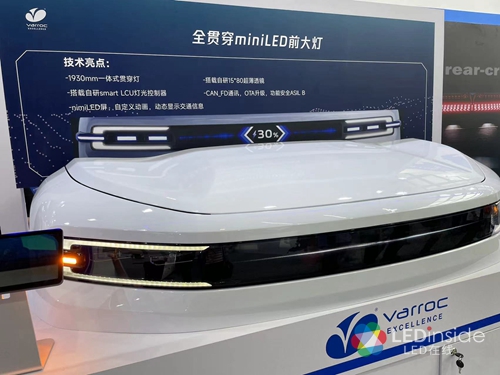
▲ Pillar-to-pillar Mini LED headlight
Mini LED taillights have also become increasingly popular in the past two years. Xunchi and MIND showcased high-resolution Mini LED taillights allowing visualized interactions. Specifically, Xunchi showcased the Xunchi 2nd-Gen Mini LED module with 24,000 P0.92 Mini LEDs, reproducing detailed images and rich colors.
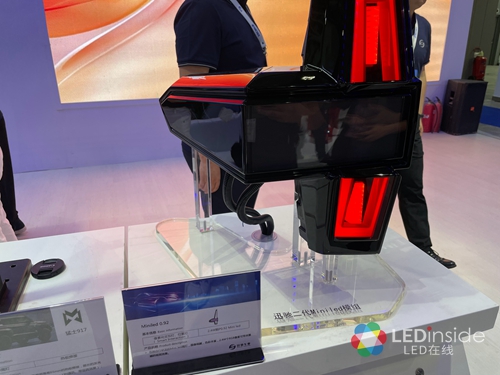
▲ Xunchi 2nd-Gen Mini LED module
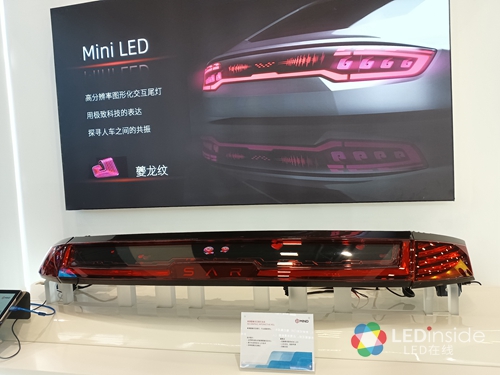
▲ Interactive Mini LED taillight by MIND
SEEKIN presented various full-width taillights, one of which was a Mini-pixel interactive product.
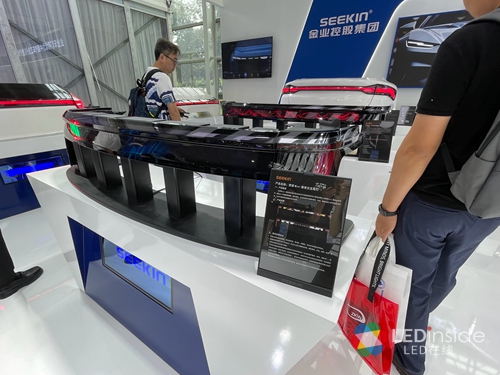
▲ Mini-pixel interactive taillight by SEEKIN
Among the automotive LED manufacturers, Honglitronic showcased a full-width taillight developed in collaboration with Geely. Dominant also showcased products compatible with full-width taillights including the L-Spice 30°x 80°. SUNPU LED also presented full-width taillights.
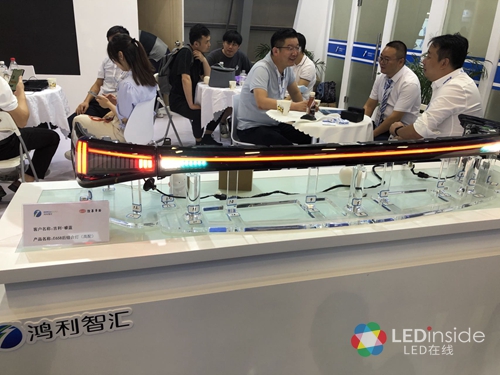
▲ Full-width taillight by Honglitronic
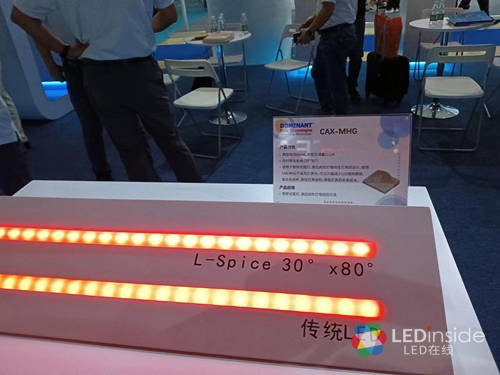
▲ Dominant-L-Spice
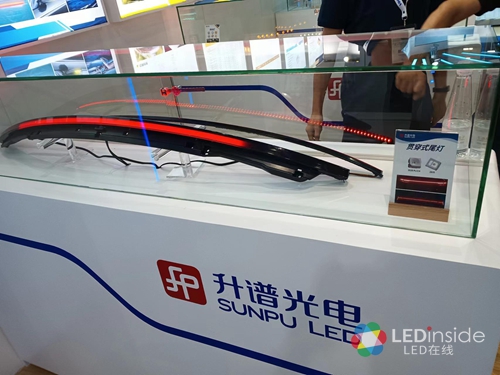
▲ Full-width taillight by SUNPU LED
In terms of Mini LED taillights, Refond exhibited the P2.0 automotive-grade Mini LED taillight featuring visualized interactions, available in various designs including monochrome, white light, and full-color RGB options. Lattice Power, on the other hand, presented the 4-in-1 silicon-based Mini LED smart interactive taillight, which is powered by RGB chips in fully vertical structure, emits light from a single side and offers exceptional light quality and reliability.
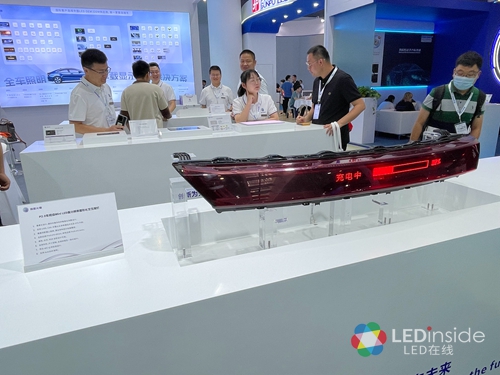
▲ Interactive Mini LED taillight by Refond
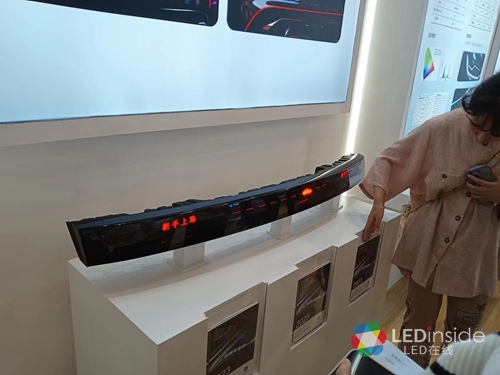
▲ Interactive Mini LED taillight by Lattice Power
Notably, Seoul Semiconductor exhibited a novel integrated packaging solution that is perfectly matched to taillights. Known as “Thin Red”, the solution does not require wiring.
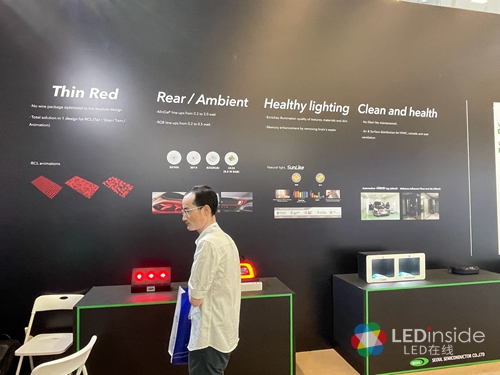
▲ The Thin Red solution proposed by Seoul Semiconductor
To meet the requirements of full-width and indicator taillights, Macroblock introduced the MBI5353Q and automotive MOSFET MBI5989Q. The MBI5353Q can control up to 1,536 LEDs individually, allowing for a more diverse range of lighting effects in taillights. The 16-channel MBI5989Q features built-in ghosting elimination, high-contrast interference elimination, and LED short-circuit caterpillar removal.
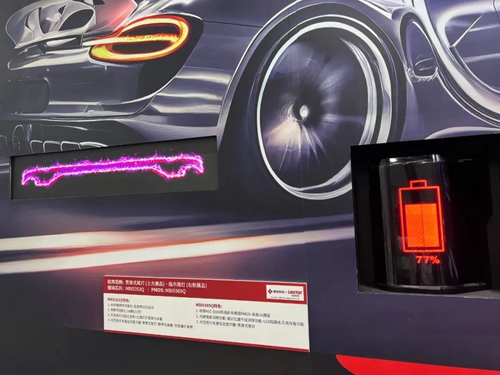
▲ MBI5353Q、MBI5989Q
The Rise of ADS Marker Lamps and Grille Lights
At the ALE event, innovative products such as ADS marker lamps, grille lights and ambient lights attracted considerable attention, particularly the ADS lamps.
The ADS marker lamp was created in response to the development of autonomous driving. As Lightning explained, an ADS marker lamp is primarily used to alert other road users that a vehicle is in autonomous driving mode. A vehicle is equipped with at least four ADS lamps, with one or two installed in the front and rear, and at least one on each side. Currently, several LED package providers have introduced corresponding solutions, such as SUNPU LED, Lightning, APT Electronics, Dominant and Seoul Semiconductor.
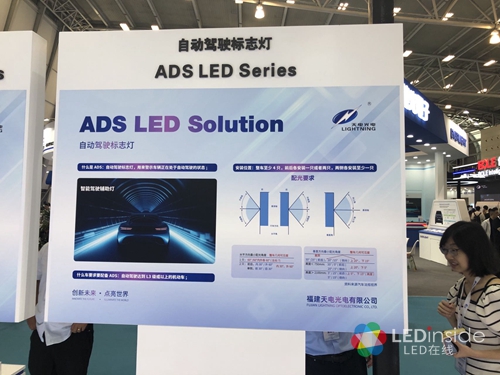
▲ Marker lamp solution proposed by Lightning
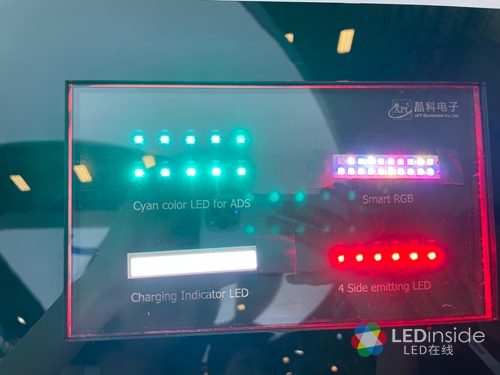
▲ Marker lamp solution proposed by APT Electronics
SUNPU LED offers two color options of marker lamps for autonomous driving, and after the release of relevant standards, it will cover other colors.
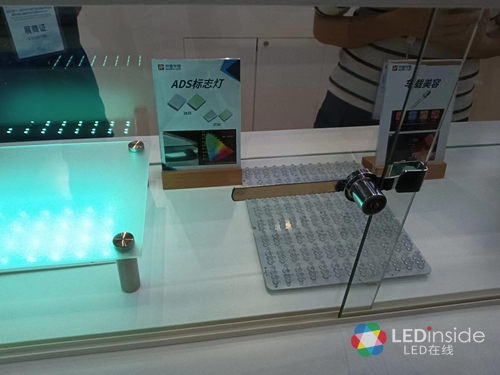
▲ Marker lamp solution proposed by SUNPU LED
Both Dominant and Seoul Semiconductor showcased their ADS maker lamps coming with cyan LEDs.
Dominant’s solution is powered by chips with a wavelength of 491-498nm, offering higher color purity compared to solutions modulated using fluorescent powder.
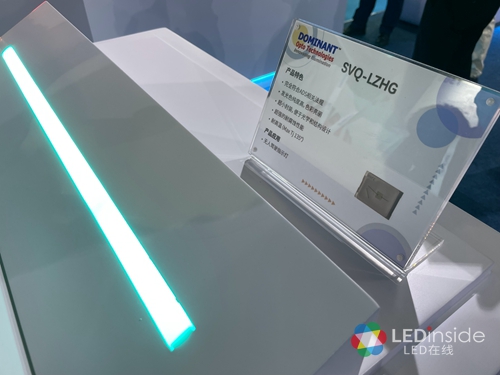
▲ Marker lamp solution proposed by Dominant
Seoul Semiconductor has supplied its cyan WICOP to mass-produced vehicles. In addition, its cyan 3014 LED packages is also set to enter mass production soon.
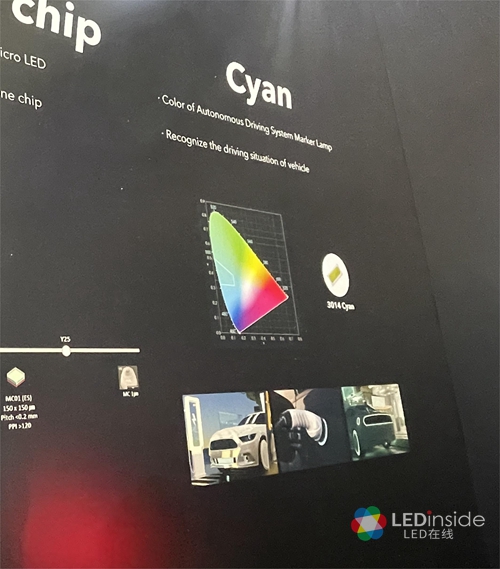
▲ Cyan WICOP by Seoul Semiconductor
SEEKIN presented a unique grill light during the event—the dynamic interactive front grille light. This product features white pixels on both sides, allowing for the design of interactive displays such as pedestrian recognition lights. Currently, only the white light option is available.
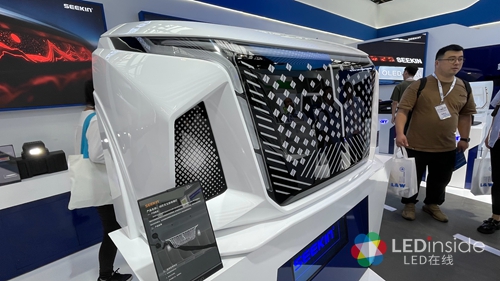
▲ Front grille light featuring real-time interactions by SEEKIN
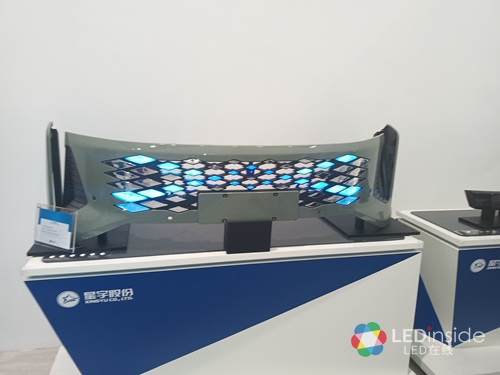
▲ Digital grille light by Xingyu
Honglitronic showcased the self-developed pixelated grille ambient light under its FodaLite brand. It enables human-machine interaction and dynamic colorful effects, offering various modes such as welcome greetings, safety reminders, turn signal assistance, musical rhythm and parking displays.
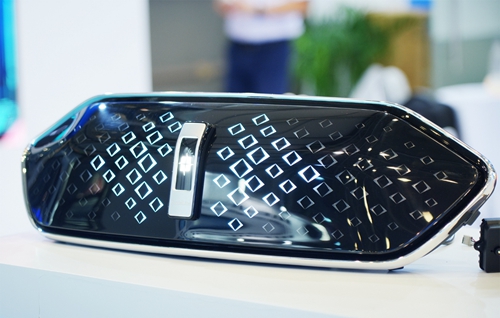
▲ Pixelated grille ambient light by Honglitronic
Equally creative is the automotive beauty light exhibited by SUNPU LED, which stood out as a unique presence at this exhibition. Derived from beauty LEDs, this product is used on car lights to illuminate passengers during the journey, achieving a beautifying effect.
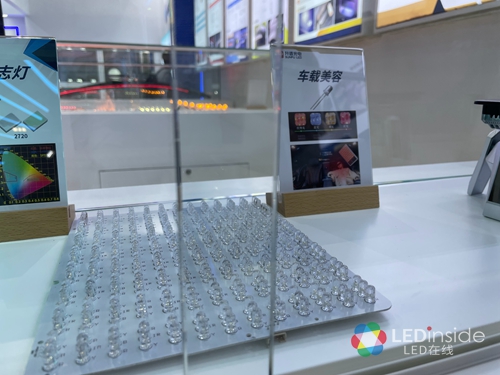
▲ Vehicle-mount beauty light by SUNPU LED
Automotive Displays: Increasing popularity of Mini LED-backlit displays
Last year, Mini LED backlighting made its official debut in the automobile sector, with brands such as Mercedes-Benz, Li Auto, NIO and GWM adopting Mini LED automotive displays. At ALE 2023, the attention and discussion around automotive displays were equally high, despite car lights being the main focus.
LED package makers, including Nationstar, Honglitronic, Refond, Lattice Power, APT Electronics, and Lightning, coincidentally showcased automotive Mini LED display products, with many of them presenting 12.3" screens.
Nationstar’s automotive Mini LED backlight comprises three technical solutions: the POB white LED, POB blue + QD film, and COB blue + QD film solutions. Notably, cars equipped with the POB white LED solution are reportedly set to be launched soon.
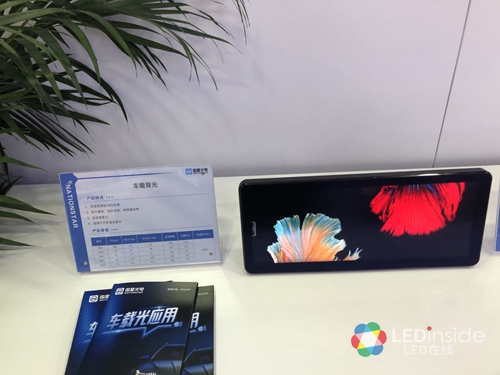
▲ Automotive Mini LED backlight by Nationstar
Honglitronic exhibited a 12.3" Mini LED dual-screen developed by its subsidiary Guangzhou Hongli Display. The automotive display features over 4,000 dimming zones, a peak brightness of 1,400 nits, and a million-to-one contrast ratio, with color gamut of over NTSC 100%.
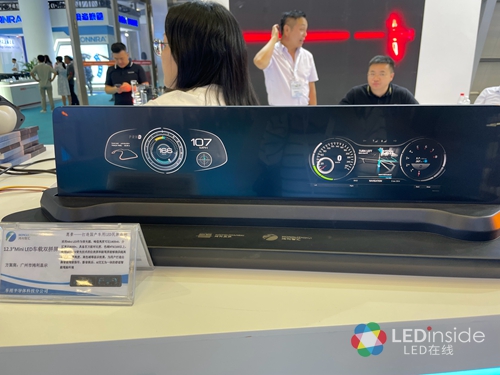
▲12.3" Mini LED automotive dual-screen
Refond introduced several COB-based Mini LED automotive screens such as the 10.95" (384 zones) and 15.6" (1,144 zones) center console displays, as well as other one-light-one-zone solutions. Additionally, Refond showcased innovative automotive-grade Mini LED full-color/monochrome dynamic car logos.
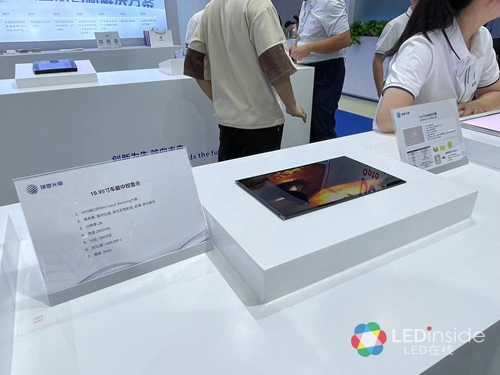
▲ COB-based Mini LED center console
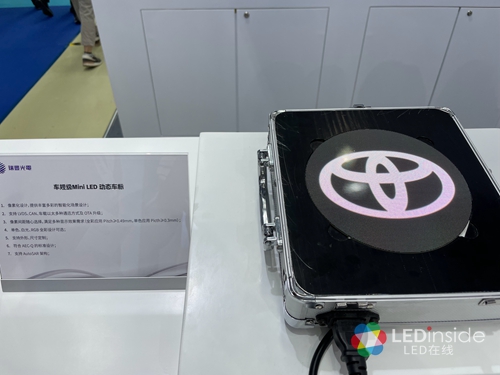
▲ Mini LED dynamic logo light
Lattice Power and Lightning also displayed 12.3" automotive Mini LED displays. Lattice Power’s display comes with 1,380 local dimming zones, while Lightning exhibited a Mini POB automotive display boasts 1,536 dimming zones.
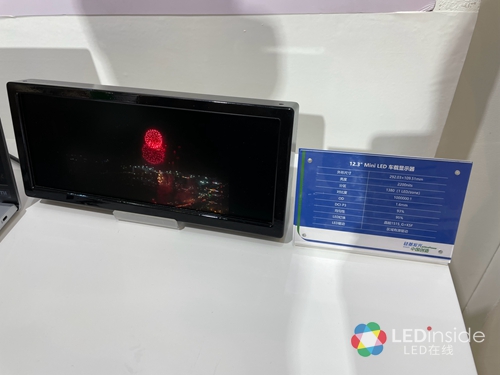
▲ Automotive Mini LED display by Lattice Power
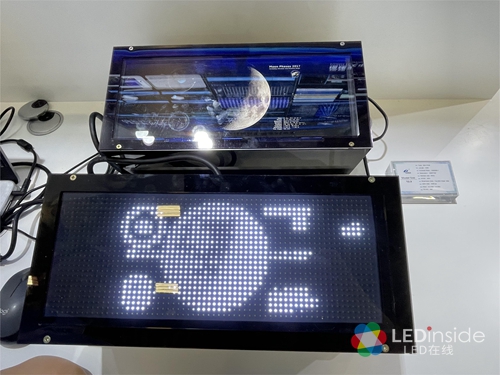
▲ Automotive Mini LED display by Lightning
APT Electronics presented an AM Mini LED automotive display featuring COB backlights equipped with a blue chip + QD film solution. Integrating 5,760 Mini LEDs, it comprises 960 local dimming zones and a contrast ratio of 1,000,000:1.
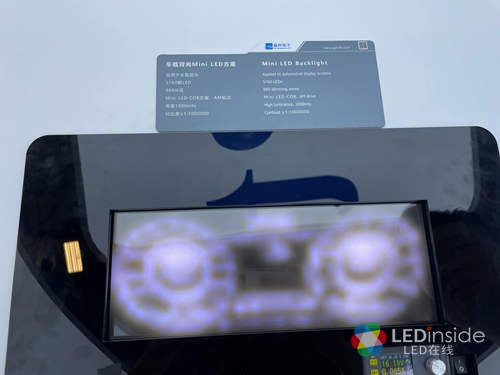
▲ Automotive Mini LED display by APT Electronics
Conclusion
As LEDinside discovered, the ALE event this year is arguably the liveliest in recent years, fully illustrating that automotive lighting is a highly anticipated segment for LED lighting. In addition to general products, the emerging technologies and product solutions witnessed on-site brought a sense of surprise, further highlighting the trend towards smartification, personalization and interactions in the future development of automotive lighting and in-vehicle displays.
Currently, market demand has yet to soar, and automotive LED manufacturers have a journey ahead in terms of testing, verifying and implementing new technologies. However, overall, the end-market has conveyed positive signals, suggesting significant potential for the supply chain in the medium to long term.
(By Janice from LEDinside)




















































